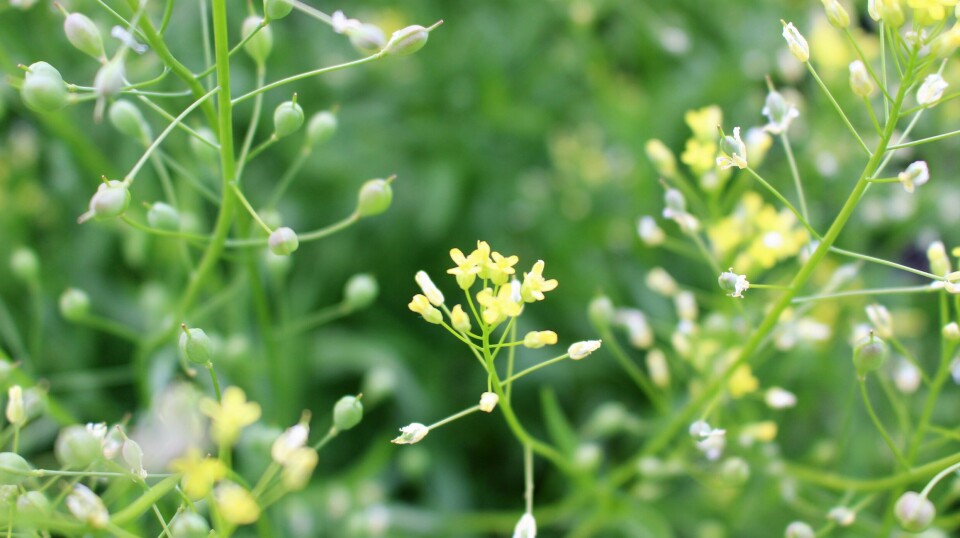
BioMar forms partnership to commercialise omega-3 camelina
UK-developed GM oilseed plant is a potentially excellent solution for crop DHA and EPA, says feed producer’s chief executive
Salmon feed producer BioMar has signed an agreement with US company Yield10 Bioscience to form a long-term partnership to commercialise a genetically modified oilseed crop containing enriched levels of the omega-3 long chain fatty acids EPA (eicosapentaenoic acid) and DHA (docosahexaenoic acid) equal to fish oil.
The GM camelina, developed over more than two decades by Professor Johnathan Napier and his team at Rothamsted Research in Hertfordshire in England, contains EPA and DHA levels comparable to many of the marine oil sources utilised today.
It is ideally designed for the needs of the aquaculture industry and is a complementary fit into the BioMar Omega Technology concept together with other sources of essential omega-3s, BioMar said in a press release.

BioMar has been actively involved with the Rothamsted omega-3 camelina development effort since 2013 and has conducted many of the salmon trials published by the Rothamsted research team. Producing omega-3 oil in Camelina represents a land-based way to make this key aquafeed ingredient, said the feed manufacturer.
Oil for testing
“A partnership with BioMar has the potential to combine the strengths of both companies for the accelerated development of the omega-3 camelina product,” said Yield10 president and chief executive Oliver Peoples.
“We look forward to working closely with BioMar to develop a collaborative programme to bring this new source of high-quality EPA and EPA+DHA omega-3 oils to the market to strive to meet the aquaculture industry’s growth demand and sustainability goals.”
Over the next year, Yield10 expects to scale-up planted acres of camelina to supply BioMar with oil for formulation and testing while also working towards securing regulatory approval for commercial production of omega-3 camelina oil and meal in targeted production geographies.
“We believe that the Yield10 omega-3 camelina technology represents a potentially excellent solution for producing crop omega-3 oils at commercial scale,” said BioMar Group chief executive Carlos Diaz.
“Reliable and scalable sources of EPA and DHA are critical for aquafeeds to ensure the sustainable development of the aquaculture industry. We look forward to working together with the Yield10 team to make this product a commercial success.”
Authorisation
In 2020, Yield10 signed an exclusive collaboration agreement with Rothamsted to support Rothamsted’s programme to develop omega-3 oils in camelina. As part of the collaboration agreement, Yield10 received an exclusive option to sign a global, exclusive licensing agreement for the technology. Yield10 recently announced it had exercised this option and plans to finalise the global exclusive licence with Rothamsted.
Yield10 has applied for product authorisation in the United States, initially with a camelina that produces EPA, and is also preparing an application for a variety producing both EPA and DHA.
GM products are not currently allowed in Scotland, but an omega-3 fish feed ingredient derived from genetically modified canola became the first GM product to be approved for use in Norway in June.
Australian-owned Nuseed won approval for its Aquaterra-branded oil derived from GM canola (a type of oilseed rape) after Norway’s Science Committee for Food and Environment (VKM) carried out a risk assessment of the product for use in fish feed on behalf of the Norwegian Food Safety Authority (Matillsynet).
No increased risk
The committee concluded that fish feed containing the oil does not pose an increased health risk for fish or have any indications of increased environmental risk compared to conventional fish feed with oils from other sources.
Nuseed already has approvals for Aquaterra use in the United States, Canada, and Australia, and Aquaterra was commercially launched for use in Chilean salmon production in 2020. The company is also seeking approval for Aquaterra for animal feed uses in the European Union and United Kingdom.
Napier believes the camelina created by Rothamsted has superior composition, since its oil accumulates both EPA and DHA to around 10% each, whereas Nuseed’s canola products primarily accumulates only DHA.
"We might be late to the party but we're the one that's turning up with the champagne," he told Fish Farming Expert magazine.























































